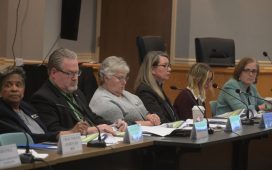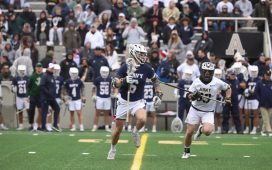Maybe it’s something in the water at Claiborne. But over the weekend, freshman sire Lea (First Samurai) had his first stakes winner when Vast won the Hollywood Wildcat Stakes at Monmouth by two and three-quarter lengths, and Algorithms got his first Grade 1 winner when Math Wizard won the Pennsylvania Derby at 31-1.
In fact, Algorithms had an astonishing weekend. In addition to Math Wizard setting up a tremendous payout for bettors who liked his chances in the race, Algorithms had a second stakes winner on Saturday with Hypothesis in the Harry Mercer Memorial at Charles Town and a pair of stakes-placed horses: Taylor’s Spirit was third in the G3 Charles Town Oaks and He Hate Me was third in the G3 Frank De Francis Memorial Dash.
The handsome bay son of Bernardini (A.P. Indy) currently has eight stakes horses racing around the country and is sitting at 69 percent starters to foals and 48 percent winners to foals, both well above the breed averages. Algorithms, however, didn’t get these graded and black-type results immediately with his first crop, now 5, and this year, he covered a small book because mare owners weren’t seeing enough black-type horses. The current run of stakes action, along with Recruiting Ready, who won the G3 Gulfstream Park Sprint earlier this year, may have rectified that situation.
A foal of May 4, Math Wizard was bred in Kentucky by Lucky Seven Stable, and that operation put the colt in training, raced him, and then lost him on a $16,000 claim from trainer Antonio Sano when the colt finished third behind Maximum Security at Gulfstream on Dec. 20 last year. Sano ran Math Wizard back at the same level, and the colt won and was claimed; raced for $25,000 claiming, Math Wizard was claimed a third time in succession and exited that phase of his career.
The Pennsylvania Derby winner was raised at Upson Downs of Alex and Sarah Rankin near Louisville. Alex Rankin said, “Math Wizard was the last foal out of the mare. He was a tough little guy from the start. He wasn’t the biggest horse in the field, but he had plenty of competitive spirit.”
Lucky Seven Stable is the operation of the four Mackin brothers from Louisville. Rankin said, “They own Metal Sales, and I believe they still own Yellow Cab in Louisville. They have another company called Thoroughbred Plastics. There are four brothers who run these businesses together, and their father Leo Mackin was a CPA in Louisville and got them involved in business and the horses.
“They bought four or five yearlings this year and last, and they have two mares with me now, including Sister Blues (Pioneerof the Nile). She’s an interesting story because they sent her to us early in the year in 2017 with the intention of breeding her, then continuing to race her.
“She came in about mid-February, was bred on the 17th day she was at the farm, got right in foal, then went back to racing, where she won three in a row,” including the 2017 Opelousas Stakes at Louisiana Down in August.”
In 2017, Math Wizard was a tough-minded yearling learning his early lessons toward becoming a racehorse, but his pedigree was already distinguished.
The family traces back through the mists of time to the imported mare Myrtle, by the English Derby winner Mameluke. Myrtle was imported to Tennessee in 1836, and this became famous as the family of the fine 19th century racemare Maggie B B (Australian) and her granddaughter Sallie McClelland (Hindoo), winner of the 1890 Spinaway Stakes and 1891 Alabama Stakes at Saratoga.
By the time that the Royal Note mare Royal China came to the races 70 years later, some of the gloss had come off this branch of the family, and Royal China won only three of her 23 starts. The bay mare got the memo, however, and two of her three foals earned black type. These were Stephanos (Boldnesian), three times second in handicaps at 2 and 3, and Lachesis (Iron Ruler), who won the 1975 Interborough Handicap and was second in the 1976 Fall Highweight against colts.
Retired to stud, Lachesis got her best racer as her first foal, the Tentam horse Muskoka Wyck. A winner in 10 of 50 starts, Muskoka Wyck got a well-deserved reputation as an almost horse, running second in four stakes and third in two more, including the G2 Fall Highweight in 1984. Through much of his career, however, it appeared that Muskoka Wyck would be a placer but never a winner of a stakes. But in 1985 at 6, the bay won the Coaltown Stakes at Aqueduct.
As her third foal, Lachesis produced the Halo filly Halo My Baby, who brought $175,000 at the 1983 Fasig-Tipton July yearling sale, then resold the next spring as a 2-year-old in training for $450,000 out in California. As a yearling, she had ranked fourth-highest among all Halo yearlings sold and was the top lot among the sire’s juveniles.
And she never raced.
That, of course, did not stop her from becoming an important broodmare. She produced 14 foals, 13 racers, and 12 winners. Like her dam, Halo My Baby produced a stakes winner as her first foal. That was the Czaravich horse Art Work, who won the Bastille Day Handicap at Hollywood Park and placed third in the G3 La Jolla Handicap at Del Mar and in the G3 Ascot Handicap at Bay Meadows.
Halo My Baby also produced the stakes-placed Green Baby (Green Dancer), Dontcallmemary (Imperial Falcon), and Red Wraith (Thirty Six Red). The mare’s best racehorse and most important for the subject of this story came as her tenth foal in 1998. By champion Deputy Minister, this foal was named Minister’s Baby and won a trio of stakes as a 4-year-old, including the G3 Gardenia Handicap in 1992.
Minister’s Baby foaled a pair of stakes winners. The first was Ginny’s Grey (Political Force), and Math Wizard was the mare’s last foaled, produced when she was 18.
As a May foal, Math Wizard would have been notably smaller and more immature than many of his early pasture mates, but the bay son of Algorithms looked plenty big through the stretch of the Pennsylvania Derby. He’s all grown up now.
Frank Mitchell is author of Racehorse Breeding Theories, as well as the book Great Breeders and Their Methods: The Hancocks. In addition to writing the column “Sires and Dams” in Daily Racing Form for nearly 15 years, he has contributed articles to Thoroughbred Daily News, Thoroughbred Times, Thoroughbred Record, International Thoroughbred, and other major publications. In addition, Frank is chief of biomechanics for DataTrack International and is a hands-on caretaker of his own broodmares and foals in Central Kentucky. Check out Frank’s lively Bloodstock in the Bluegrass blog.
New to the Paulick Report? Click here to sign up for our daily email newsletter to keep up on this and other stories happening in the Thoroughbred industry.
Copyright © 2019 Paulick Report.








